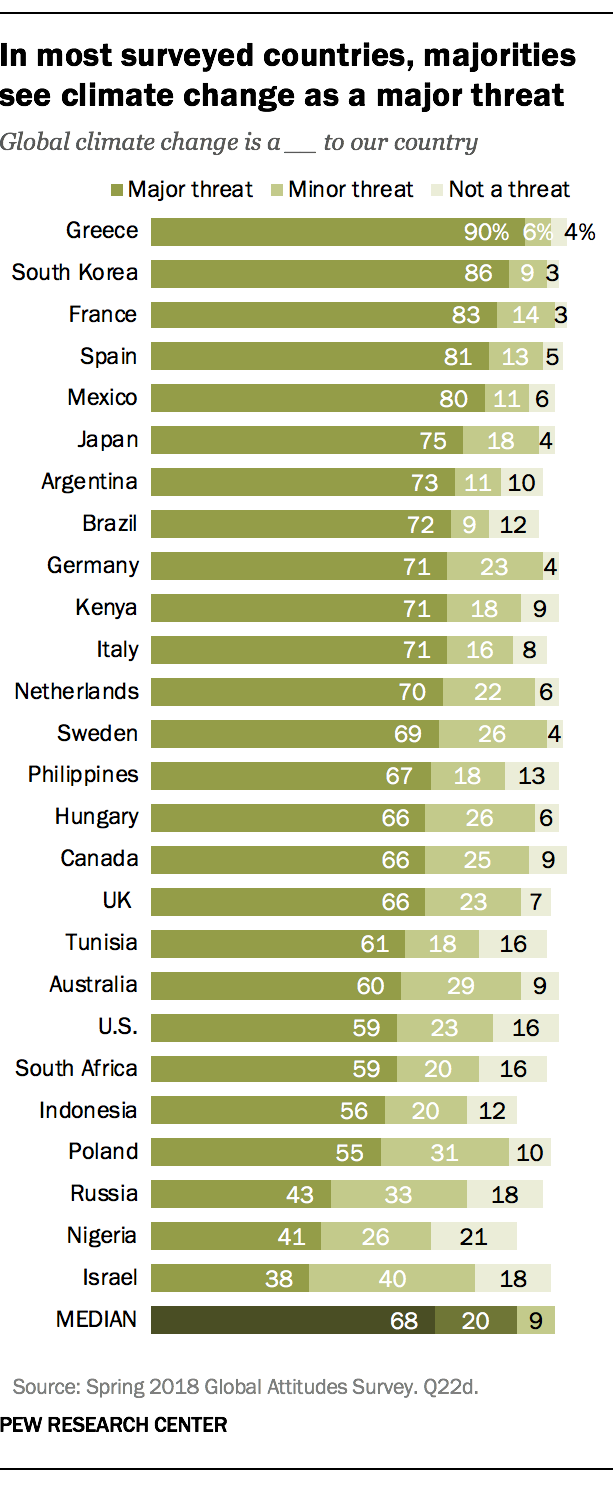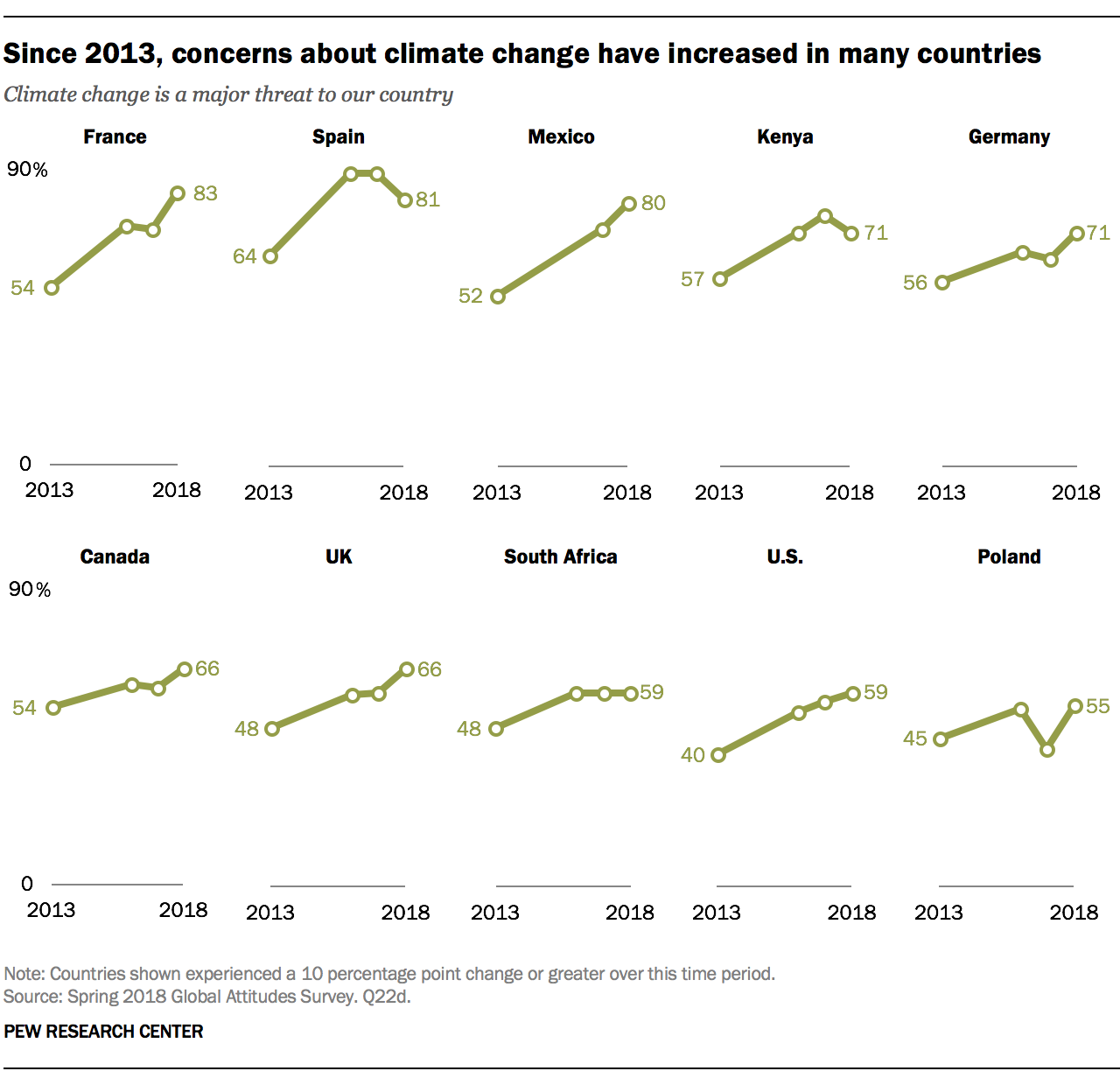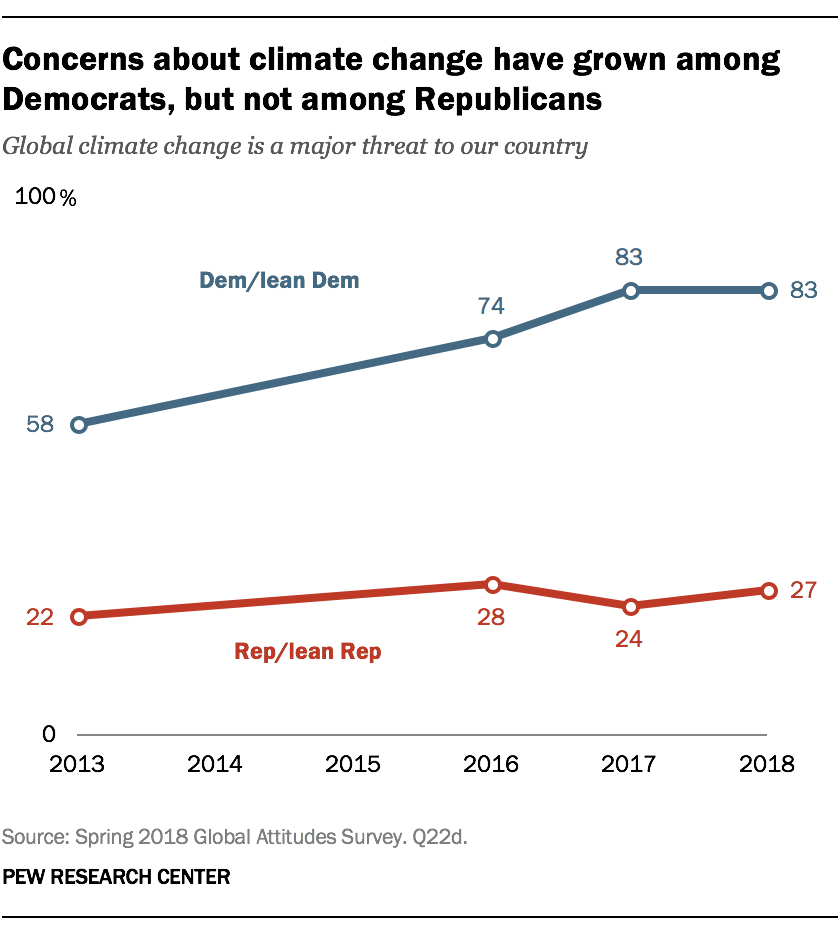
April 22 is Earth Day, an annual event that highlights environmental concerns and encourages civic action. This year’s Earth Day comes amid widespread global concern about climate change.
Here are five facts about how people globally see climate change, drawn from a 2018 Pew Research Center survey on how people evaluate eight potential threats, as well as other polls conducted by the Center. (For more on how people in the United States see climate change, see our companion post, “How Americans see climate change in 5 charts.”)
1 Majorities in most surveyed countries say global climate change is a major threat to their nation. In fact, it’s seen as the top threat in 13 of 26 surveyed countries, more than any other issue the survey asked about.
Majorities in most surveyed countries say global climate change is a major threat to their nation. In fact, it’s seen as the top threat in 13 of 26 surveyed countries, more than any other issue the survey asked about.
People in Greece express very high levels of concern, with 90% labeling climate change a major threat (similar to the 88% there who cite the condition of the global economy). People in South Korea, France, Spain and Mexico also express strong concerns. Eight-in-ten or more in each of these countries say climate change is a major threat.
Americans are less likely to be concerned about climate change, with 59% seeing it as a serious threat. About as many people in the United States cite climate change as point to ISIS (62%) and North Korea’s nuclear program (58%). Americans most frequently cite cyberattacks as a major threat.
People in Russia (43%), Nigeria (41%) and Israel (38%) are the least likely to say climate change is a major threat to their nation.
2Substantial shares see climate change as a minor threat or not a threat at all. Not all people in the surveyed countries consider climate change to be a major threat. A median of 20% across these countries consider global warming a minor threat, while 9% say it is not a threat.
About half or more in Israel and Russia say global climate change is a minor threat or not a threat (58% and 51%, respectively). In the U.S., roughly a quarter (23%) believe climate change is a minor threat, while 16% say it is no threat at all.
3Concerns about climate change have risen significantly in many countries since 2013. The share of people expressing concern about the threat of climate change around the world has grown since 2013, when Pew Research Center first asked respondents whether they see it as a major threat to their nation. In 2013, a median of 56% in 23 countries said climate change was a major threat; in the Center’s most recent Global Attitudes survey, a median of 67% in the same countries hold this view. And in 10 countries, the share of people who see global warming as a major threat has grown by at least 10 percentage points. For example, 83% of people in France say this, up from 54% in in 2013, an increase of 29 points. Mexico has seen a similar increase, from 52% to 80%, or 28 points.
 Americans have also grown more concerned about climate change, even if their overall level of concern is lower than in some other countries. Nearly six-in-ten Americans see climate change as a major threat (59%), up 19 points from 2013.
Americans have also grown more concerned about climate change, even if their overall level of concern is lower than in some other countries. Nearly six-in-ten Americans see climate change as a major threat (59%), up 19 points from 2013.
4 People with more education tend to be more concerned about climate change; in some countries, women and younger people are also more concerned. Education, gender and age are related to evaluations of climate change as a threat. In most countries surveyed, those with higher levels of education are more likely than those with less education to see climate change as a serious threat. For instance, Hungarians with a postsecondary or higher education are 11 percentage points more likely than their less-educated counterparts to say that climate change is a major threat. Women are more likely than men to be concerned about climate change in nine of the 26 surveyed countries. In Canada, for example, 72% of women consider climate change a major threat, compared with 59% of men. Age is also associated with views of climate change in some countries. In the U.S., 71% of those ages 18 to 29 say climate change is a threat, compared with half of Americans 50 and older.
People with more education tend to be more concerned about climate change; in some countries, women and younger people are also more concerned. Education, gender and age are related to evaluations of climate change as a threat. In most countries surveyed, those with higher levels of education are more likely than those with less education to see climate change as a serious threat. For instance, Hungarians with a postsecondary or higher education are 11 percentage points more likely than their less-educated counterparts to say that climate change is a major threat. Women are more likely than men to be concerned about climate change in nine of the 26 surveyed countries. In Canada, for example, 72% of women consider climate change a major threat, compared with 59% of men. Age is also associated with views of climate change in some countries. In the U.S., 71% of those ages 18 to 29 say climate change is a threat, compared with half of Americans 50 and older.
5 In the U.S., there’s a wide partisan gap about climate change. Among American adults, Republicans and Republican-leaning independents are less likely than Democrats and Democratic leaners to express concern about climate change. Roughly a quarter (27%) of Republicans say climate change is a major threat, compared with more than three-quarters of Democrats (83%) – a 56 percentage point difference. Democrats have also grown more worried about climate change since the question was first asked five years ago, while Republican opinions on climate have remained roughly the same.
In the U.S., there’s a wide partisan gap about climate change. Among American adults, Republicans and Republican-leaning independents are less likely than Democrats and Democratic leaners to express concern about climate change. Roughly a quarter (27%) of Republicans say climate change is a major threat, compared with more than three-quarters of Democrats (83%) – a 56 percentage point difference. Democrats have also grown more worried about climate change since the question was first asked five years ago, while Republican opinions on climate have remained roughly the same.
This trend is consistent with wide and growing political divides among Americans on a range of beliefs about climate issues.




